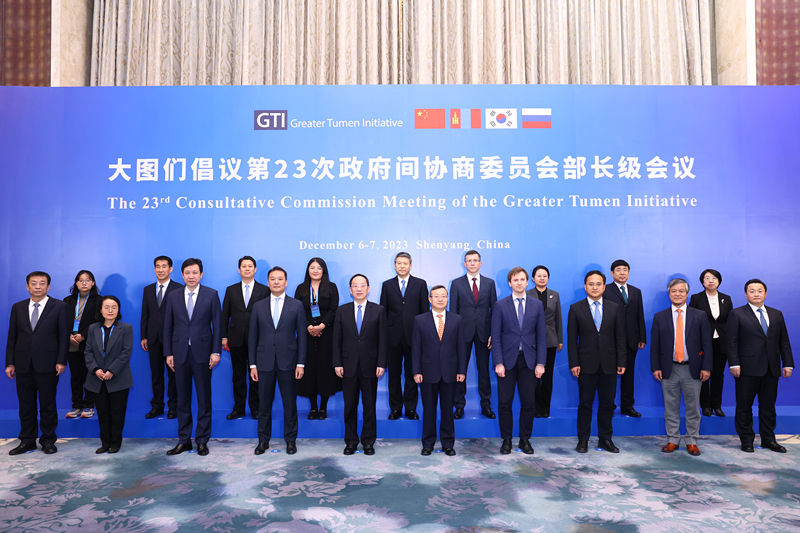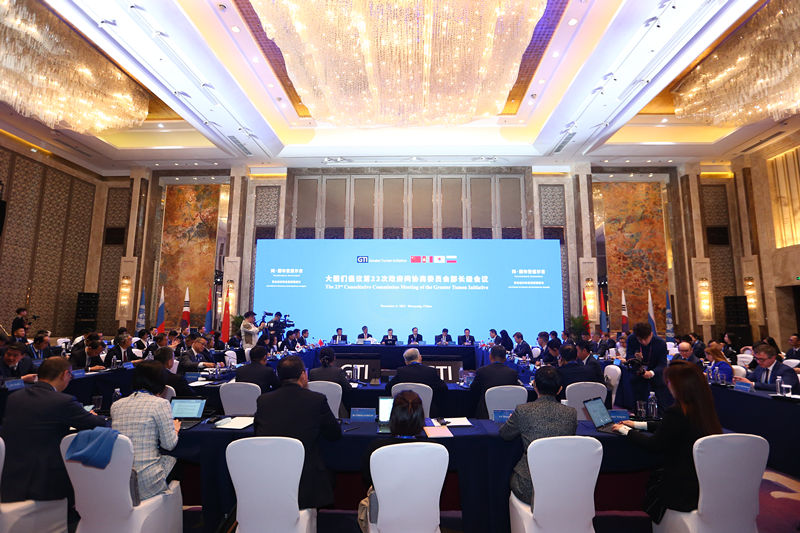
Shenyang - On 6 December 2023, the 23rd Consultative Commission Meeting of the Greater Tumen Initiative was successfully held in Shenyang, Liaoning Province, China with a virtual attendance option. GTI Member States (the People’s Republic of China, Mongolia, the Republic of Korea, the Russian Federation), as well as high-level representatives from line ministries, the local governments of Northeast Asia (NEA), financial institutions, research institutions and international organizations attended the meeting. The side events Policy Dialogue on Digital Economy - 2nd Annual Forum on Connectivity and the 14th Northeast Asia EXIM Banks Association (NEA EBA) Working-level Meeting were also successfully organized on the same day.
H.E. Mr. Wang Shouwen (China International Trade Representative (full minister rank) and Vice Minister of Commerce of China) opened the meeting with a warm welcome to all delegates. Countries in Northeast Asia have different resource endowments, highly complementary economies, closely linked supply chains, and huge potential for economic and trade cooperation. Yet, under the circumstances that globalization encounters headwinds, protectionism and unilateralism are on the rise, he advocated for GTI members a) to strengthen open cooperation, to support the multilateral trading system, stick to open regionalism in advancing regional economic integration, actively explore bilateral and regional trade arrangements, and keep cutting tariff and non-tariff barriers; b) to boost connectivity, both for “hard connectivity” – by creating convenient and smooth transportation channels in Northeast Asia, and “soft connectivity” - by smoothing customs clearance and reducing trade costs; c) to promote innovative development, focusing on capacity building and policy practice sharing on trade facilitation, investment cooperation, digital inclusion, and MSMEs.
Then the meeting was followed by the opening remarks from H.E. Mr. Choi Jiyoung (Online) (Deputy Minister for International Affairs, Ministry of Economy and Finance, Republic of Korea), Mr. Alexander Dyukarev (GTI National Coordinator, Deputy Director General, Department of Multilateral Economic Cooperation and Special Projects, Ministry of Economic Development, Russian Federation), H.E. Mr. Tuvdendorj Gantumur (Vice Minister of Economy and Development, Mongolia), and H.E. Mr. Li Lecheng (Governor of Liaoning Province, People’s Republic of China).
H.E. Mr. Choi Jiyoung noted that the expectations for global economic recovery are rising after the pandemic, however, the world still faces several uncertainties, including disruptions to the supply chain and inflation. As the only regional economic development mechanism within NEA, GTI shall continue serving as the platform for discussing various issues in Northeast Asia as well as the rest of the world, such as the digital economy and responding to climate change. In this regard, he proposed three directions for the GTI: 1) member countries to accelerate the discussions on the legal transition, 2) reinforcing the cooperation with associations like the NEA EXIM Banks Association, NEA Business Association and Local Cooperation Committee, to attract fundings, external experience and technical support in developing GTI projects, and 3) encouraging North Korea to rejoin GTI to strengthen the interconnection and regional development. Lastly, he recommended member states make more active use of GTI as a platform for boosting the development of NEA.
Mr. Alexander Dyukarev mentioned that the world economy is going through major transformations spurred by the pandemic and unilateral restrictions. Noting the Northeast Asia region, as a potential beneficiary of the transformations as the regional economy is growing faster than globally, he encouraged deepening partnerships both bilaterally and within multilateral fora including the GTI. He appreciated that China chose the digital economy as a GTI priority this year, because digitalization is a cross-cutting topic with impacts on all GTI sectoral workstreams, while the trade and investment sector is a backbone of the GTI cooperation. In this regard, he highlighted the potential of deepening joint efforts on paperless trade. He also noted the importance of transport connectivity and the need for more expert activities on developing new transport routes. He suggested finding tailored pathways towards low-emissions development reflecting national socio-economic circumstances without undermining energy security in the region, and continuing the dialogue to develop clean energy solutions, including hydrogen energy. Also, the next GTI Tourism Board Meeting will be held in Russia, with a focus on ecotourism development.
H.E. Mr. Tuvdendorj Gantumur highlighted the importance of involving Mongolia in regional and international cooperation and considered GTI as a common platform for mutual support in advancing economic and social cooperation, and people-to-people ties. He stressed the significance of the digital transition in future development in the background of the pandemic. Mongolia has made substantial progress in digital development, including establishing the Ministry of Digital Development and Communications, and is becoming a “Digital Nation”. He displayed the rapid increase in e-commerce in Mongolia and the efforts to improve the intensification of digital development and infrastructure with data. In Mongolia, an electronic platform - "E-Mongolia" for government services has been developed to support business owners, improving the business environment. He also emphasized the importance of regional and international cooperation in accelerating the digital transition, and expressed optimism that the conference would foster experiences and business ideas to expand e-commerce and cooperation.
H.E. Mr. Li Lecheng welcomed attendees to Shenyang, and highlighted Liaoning's strategic role in China's opening up and the Belt and Road Initiative, noting its economic growth and commitment to becoming a hub for innovation and advanced manufacturing. He emphasized the importance of Northeast Asia's economic and cultural ties and China's commitment to enhancing cooperation with neighbouring countries, and proposed three suggestions regarding Liaoning Province: 1) deepening economic ties through Liaoning's strategic location and trade zones, 2) enhancing cooperation in key industries to develop a modern industrial system with an emphasis on digitalization and advanced manufacturing, and 3) strengthening cultural exchanges in the field of science, education, sports, and tourism. Lastly, he invited all guests to explore Liaoning province and to feel its good business environment and prospects for development.
Afterwards, the GTI Member States first positively reviewed the Overall Progress since the 22nd CC Meeting in December 2022, welcomed the Project Report on Capacity Building Needs Assessment for Effective Power Interconnection Cooperation in North-East Asia, and endorsed GTI’s expenditure report, budget proposal and the work plan for the period ahead as well as the following documents.
- GTI Digital Economy Cooperation Roadmap
- Roadmap for Trade and Investment Cooperation of the GTI (2024-2026)
- Project Proposal on Ecotourism Development in Northeast Asia: GTI Seminar on Ecotourism Promotion and a Handbook on NEA Ecotourism Routes
In addition, Mr. Wang Liqun, Deputy Director General, Department of Commerce, Jilin Province, presented the progress of the 5th NEA Policy Dialogue on Industrial Parks. Mr. Bao Qing, Director of Regional Cooperation and Information Technology, Port Office, Inner Mongolia, presented the progress of the 11th GTI NEA Local Cooperation Committee Meeting. Mr. Kwon Sun Bok, Manager of the Korea AEO Association (KAA), presented the progress on the recent activities of the GTI Customs Sub-committee.
Under the topic of Fostering Innovative and Inclusive Digital Economy, the second session begins with the introduction to Blockchain-based Electronic Bills of Landing solution by Mr. Chen Yangfan, Executive Vice President of COSCO SHIPPING GROUP. He provided an overview of COSCO's vast maritime operations and underscored the significant role of e-bills of lading in international trade. He highlighted the potential of digitalization to enhance efficiency and security in maritime trade, particularly leveraging blockchain technology for a secure, decentralized trade network.
After the introductory speech, China called for promoting trade document digitalization among GTI member countries, focusing on electronic bills of lading and other digital documents. ROK introduced its digital economy policies to respond to challenges and opportunities brought by the digital divide, including creating a conducive environment for startups targeting investments in digital areas, expanding the use of AI in daily life, providing media education, promoting infrastructure for digital transition, etc. Noting that the pandemic and other challenges highlighted the importance of bridging digital divides and accelerated adoption of digital technologies in economic sectors and the social sphere, Russia encouraged members to further facilitate the cross-border electronic data exchange and cross-border trade with supporting documents such as e-bills of landing, and briefly introduced several related pilot projects. Mongolia reflected on its digital strategy and called for knowledge exchange on digital transformation and building trade harmonization.
The theme of the third session is Building a Stable, Connected, Secure and Efficient Supply Chain. During the introductory speech, Mr. Liu Hui, Chairman of Jinzhou Port Co., Ltd., presented the growth and importance of supply chain cooperation in NEA and the rapid trade growth in the Greater Tumen Region with various data, and mentioned the critical role of efficient and secure logistics in supporting trade cooperation. He also emphasized Jinzhou Port's strategic position and its efforts to strengthen the supply chain through international collaborations and infrastructure development.
Afterwards, China addressed that GTI member countries should adhere to market-oriented rules to ensure a stable, open, and efficient regional industry and supply chains, and strengthen the coordination of trade policies, focusing on regulatory coherence. Recognising the significance of a stable supply chain, ROK pointed out the necessity to advance international cooperation to enhance transparency and predictability in supply chain-related measures. To cope with the supply chain risks, Korea has adopted several domestic approaches, such as setting off a task force for supply chain and economic security, introducing the Framework Act to systemise the crisis management process, and establishing a Supply Chain Stabilization Fund. Although observing the disruptions in global and regional supply chains and facing logistics constraints and challenges, Russia had to refocus on new markets and balance the trade volumes of both experts and imports, and successfully removed many key restrictions, by adjusting logistic corridors to reflect the current market needs, developing measures to ensure a steady payment infrastructure, and accelerating programs for import substitution and the production of critically important products. Mongolia projected growth in its export volume by 2025, and outlined policies aimed at establishing integrated transportation and logistics networks, and enhancing trade facilitation with the development and implementation of the trade single window system and risk-based customs inspection system.
Lastly, members adopted the Shenyang Declaration*. The Government of ROK took over the GTI CC Chairmanship and confirmed that the 24th CC meeting will be hosted and chaired by ROK in 2024.
* Shenyang Declaration: /?info-800-1.html


